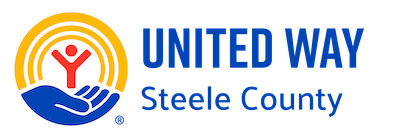A Case for Pitching In
I am privileged to spend a lot of time with people who care deeply about others and our community. Hands down it is the best part of my job. UWSC staff and these community members talk a lot about the issues that adversely affect our community, such as generational poverty, racial discrepancies in graduation rates, incidences of depression in our community, barriers to living wage jobs, lack of resilience in young people, effects of increasing use of illicit substances, and why there are hungry people in Steele County. These are real issues in our community and frequently people say “why isn’t anyone doing anything about it?”
That question invariably leads to the follow up question: “Whose responsibility is it to fix these problems?”
This is the complicated question that our entire culture is struggling with at the moment. You can take any of the issues I listed above and point to the school system, or the government, or individuals, or houses of worship, or Wall Street. In fact, I hear each of these institutions being blamed in turn for crime, violence, addiction, and morality.
The fact is it is OUR responsibility to fix these problems. All of us. Each of those institutions can do something to help guide our culture in these issues, and they should, but no one segment alone can fix them. No one institution SHOULD be solely responsible for fixing the problem because these problems are multi-dimensional; they should have a multi-disciplinary response. If many sectors have “skin in the game” then they truly share responsibility instead of waiting for someone else to take care of things. For example, we’ve been hearing a lot about mental health in the news and we talk about it in the community.
United Way working groups leave serious mental illness to the professionals but we do talk about a decrease in individual resilience – at home, in the workplace, at school. What this means is that as individuals face adversity they are less able to “shake it off” and remain functional in their life. When we lose, or never gain, that ability to accept adversity as a transient moment in life that we can overcome but see it instead as a residual condition we have no control over, it can morph into what we colloquially call depression (not clinical depression). This can affect our family, our careers, our education, and indeed all facets of our life. But whose responsibility is it to teach resiliency to us? If it is not taught, whose responsibility is it to deal with the consequences? These can be economic, affecting corporate productivity as well as individual living wages, individual reaction to important social situations and personal interactions, and community expectations of behavior. This is just an illustration but hopefully you can see how complicated it is to tackle these tough cultural problems and why everyone needs to be involved. Even you.
I’ve heard it said in our community that we take care of our own. We see that clearly in the attendance at fundraising benefits for individuals who needs support for medical treatment and the community generosity with nonprofit fundraisers. However, there is more for us all to do beyond the financial support. We need to get hands on and minds on.
It’s important for all of us to be looking out for where our systems and networks are falling down and do something about it. Lend a hand, give words of support, and share solutions. We need to look out for one another because there are people in need but also because it helps us, too. According to the Corporation for National Community Service volunteering helps our own psychological well-being and sense of purpose. Volunteering strengthens and broadens our social networks which reduces stress and risks of associated diseases. When we give of ourselves in this way we get a sense of accomplishment and added meaning in our lives.
We’ve all heard the phrase “if you see something, say something” to invoke everyone’s responsibility in looking out for terroristic behavior. Let’s change that to “if you see something DO something.” You are empowered to help others, to improve our community by giving of yourself to organizations or individuals in need. If you need help finding a place to do this go to our website, www.unitedwaysteelecounty.org and click on the Volunteer Connect button at the top of the page. There are 17 local organizations looking for people like you to help them meet the needs of our community. You can make a difference.
Kim Schaufenbuel is the Executive Director of United Way of Steele County. She can be reached at 507-455-1180 or via email at kschaufenbuel@unitedwaysteelecounty.org.
